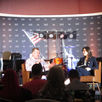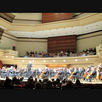Natalia Dagenhart presents her interview with Fabien Gabel
- Apr 8, 2019
- 6 min read
I am sorry that these concerts were cancelled. Still, if you want to learn more about conductor Fabien Gabel, please read this interview.

“Everything begins with the careful and detailed reading of the score as well as the study of the composers and, in many cases, of the historical context of a piece,” said acclaimed French conductor Fabien Gabel in an online interview with journalist Natalia Dagenhart. Maestro Gabel was expected to make his Chicago Symphony Orchestra debut leading works by Bartók, Debussy, and Brahms' Piano Concerto No. 2 with famous American pianist Emanuel Ax.
Chicago Symphony Orchestra musicians have been on strike since March 10. The questions for this interview were prepared and sent to Maestro Gabel right before the strike began. When we were working on it, we didn't know what would happen. But the interview is here, and please, enjoy it if you have a moment. Maestro Gabel is a world-renowned conductor and loves his job. This interview reflects that. Natalia Dagenhart hopes that justice will come and that the officials and the musicians find a solution soon. The concerts, which were so anticipated by Maestro Gabel and pianist Ax, were supposed to be held April 18-23, 2019 at Symphony Center in Chicago.
Gabel is known as a champion of French repertoire and a world-renowned conductor with a fast-growing international career. Dagenhart is happy to present her interview with Maestro Gabel.
Q. Dear Maestro Gabel, in April you are making your Chicago Symphony Orchestra debut leading works by Bartók, Debussy, and Brahms with acclaimed American pianist Emanuel Ax. What do you feel in anticipation of this debut?
A. As can be expected, I am extremely excited to conduct the Chicago Symphony Orchestra for the first time in my life. I grew up listening to recordings of this incredible orchestra, and I still can’t believe that I am about to finally get the chance to work with them. When I was a young trumpet player, the playing of Bud Herseth was my absolute reference, as he is to trumpet players all around the world.
Q. The repertoire for this concert is quite interesting – Dance Suite by Hungarian composer and ethnomusicologist Béla Bartók, Printemps by French impressionist composer Claude Debussy, and Piano Concerto No. 2 by German composer and pianist of the Romantic period Johannes Brahms. How was this repertoire chosen? Is there any idea that unites these three compositions?
A. Bartók was a great admirer of Debussy — he saw him as the greatest composer of his time — so naturally he had a great influence on Bartók’s composing. Therefore, it is quite natural to have these two composers coexist in the same program. As for Debussy’s Printemps, it is one of the lesser known pieces as it is from his Roman period. It was for this piece that the term “impressionist” was first used in the history of music, and for me, it is a wonderful counterpoint to Bartok’s Dance Suite. The choice for Brahms’s Piano Concerto No. 2 was born from the sheer desire to hear Emanuel Ax sublimate this incredible piece of music. If I had to find a link between the three composers though, it would be that they all contributed greatly to the piano repertoire, each in their own time.
Q. Have you ever performed these works? Do you consider this particular concert program challenging, and if yes, why and in what way?
A. Yes, I’ve had the chance to conduct these works before. It is always a challenge to adapt to so many different styles, all while respecting the history and culture of the music in addition to upholding the traditions of the Chicago Symphony Orchestra. As a Frenchman, I want to be sure to represent the culture of the music of Debussy, and at the same time, I must adapt to the Hungarian and German cultures of music, which are vastly different.
Q. These three works carry different moods and each of them requires its own emotional and artistic presentation. What is your approach in delivering various moods and emotions within one concert program?
A. What you have described is very much what most conductors go through when preparing and performing each concert. Above all else, I first draw upon my initial feeling and reaction to the music. Everything begins with the careful and detailed reading of the score as well as the study of the composers and, in many cases, of the historical context of a piece. This allows me to have a deeper understanding of the overall work. I also like to exchange with fellow musicians and colleagues about their impressions and experiences with the music. What follows is a natural progression.
Q. You are a regular guest conductor of major orchestras in Europe, North America and Asia. How do you build your communication with various orchestras? Do you have to find a special approach to each orchestra?
A. Each orchestra is different, so I really just try to stay myself and take the time to get to know the differently qualities I encounter with each ensemble of people. I have a great respect for the job of an orchestra musician, having been one myself, so it is only natural for me to listen and respect the musicians I come in contact with. There is no special approach — each orchestra works at a different pace, and the conductor is really there to try to best understand each part of the orchestra in order get the best music out of its members.
Q. You are recognized internationally as one of the stars of a new generation of conductors. In your mind, what is the difference between the old and the new generations of conductors, if any?
A. I would say that this is mainly due to a difference in psychology. Perhaps the older generation was a bit more harsh and authoritative. This may have come from the fact many of the conductors of the previous generations actually knew or had met the composers. Maybe this gave them the sense that they were the authority on the music. As conductors, and people, we can no longer act this way. I think that this new generation is more respectful and empathetic overall.
Q. Every conductor has his own conducting technique. How would you describe your conducting technique? Do you have any special methods to communicate with the orchestra?
A. I would have to say that above all else, I try to be as clear as possible. But for more on my technique, you would have to ask the orchestra! I’m also a firm believer that it’s best not to interfere when all is going well. Sometimes the tendency for certain conductors is to try to say or do too much when in fact there is nothing to add! As with many things in the world, sometimes less really is more. Regarding my methods in communicating with the orchestra, I try to approach each situation from both sides — by keeping in mind the viewpoint of the members of an orchestra and that of a conductor. Great music comes from great harmony, on both a musical and human level.
Q. During your career, you have worked not only with famous orchestras, but also with world-renowned soloists and singers. This time, you will conduct Brahms' Piano Concerto No. 2 with acclaimed American pianist Emanuel Ax with whom you have collaborated before. How can you describe your work with Ax in the past, and what do you expect from your collaboration this time? How much time do you usually have to practice together with the soloists?
A. My work with Mr. Ax in the past was as can be expected when working with such an amazing musician — an absolute pleasure! He is an incredibly warm individual as well, one with whom an open dialogue is immediate. Regarding this collaboration on such a pillar of the piano repertoire, I am extremely excited as he is truly, in my opinion, the artist who incarnates this concerto the best in the world. In general, when working with a soloist, we meet once before the first orchestral rehearsal to determine tempi, musical inflections, etcetera, and then we usually follow that up with one or two rehearsals.
Q. You were born in Paris into a family of accomplished musicians. You also started studying trumpet at the age of six. What is the role of your parents in your musical journey? Did they make you to study, or did you show interest in music since your young age?
A. I was very lucky to grow up in a home where music was a constant fixture throughout the day. My parents, both through their careers and their love of music, were able to pass down to me their work ethic and musical ear. It came very naturally to me to begin playing instruments — I began with the piano at 5 and the trumpet followed soon after. At no point did my parents force me into any of this; rather, they created a home environment which allowed me to be drawn naturally to music.
Q. What are your plans for the future? Do you plan to return back to Chicago with another exciting concert program?
A. My immediate plans are to spend some time visiting Chicago with my wife and sons! Following that I will spend the end of the season conducting various orchestras: the Warsaw Philharmonic, Orchestre de la Suisse Romande, Milwaukee Symphony Orchestra, and of course my orchestra, the Orchestre Symphonique de Québec.
For more information and tickets, please go to https://cso.org/ticketsandevents/production-details-2018-19/chicago-symphony-orchestra/ax-plays-brahms/?perfNo=9305 or call 312-294-3000.
Natalia Dagenhart
Photo by: Maison Simons

























Comments